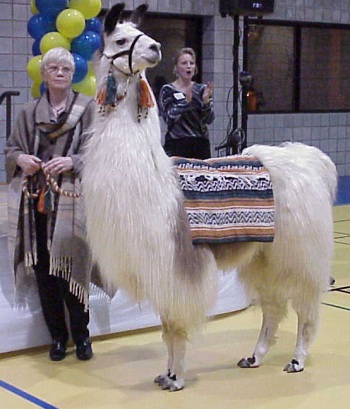| ..Leisure Acres Llamas | llamas
for sale in PA * male llamas * female llamas guard llamas * llama breeding service * llama info |

Ten Tips For New Owners
Llamas are very
easy to care for, but there are some special considerations and requirements
to keep them healthy and happy. Here's a short list of tips for
new llama owners.
| Don't buy babies younger
than 6 months, and resist the urge to play "mom". Llamas should not be left in halter all the time. Llamas must be trained to accept a halter, but leaving your llama in halter all the time is both cruel and dangerous. It can result in abscesses, ulcers, and calluses at the very least. Learn to halter your llama when it is necessary and remove the halter when the event is over.
Heat and humidity are adjustments for llamas. Llamas don't handle heat or humidity well. They must have shelter from direct sun and they need fans or some kind of air movement if their shelter is enclosed. Llamas are happy to have a hosing or bath when the heat is oppressive, and those with heavy wool need to be sheared in the spring. Some plants and trees are poisonous to llamas. Llamas are browsers and like to eat a variety of plants. Unfortunately, some vegetation (like rhododendron and wilted cherry) are very toxic to llamas. A list of toxic plants and trees is available - check with any of the associations devoted to camelids. Llamas don't like to be alone. One of the most endearing llama traits is their intense attachment and concern for each other. Never buy a single llama to be kept without any other llamas; add a llama to an existing herd or buy them as a pair. And expect some eccentric behavior if a pair is separated; if you take just one of them out of their enclosure, the one remaining may become extremely agitated and may even jump the fence in an attempt to rejoin the other. Keep them together to keep them happy and healthy. Llamas need shelter and fencing. Llamas need protection from wind, snow, rain, sun and lightning. Fencing is also necessary, but fencing appropriate for any kind of livestock of similar size should be adequate. Never use barbed wire, which can easily injure their eyes or skin. Male llamas must be handled correctly Males close to 1 year should not reside with females, and young females should not reside with males of any age. By about two years of age males develop very sharp upper and lower fighting teeth. If untrimmed, these teeth can cause serious damage to other males (and/or to an uncooperative female). Consult your veterinarian about removing the tips of your male llama's fighting teeth. Llama pens must be kept clean and free of "stuff" Llamas are curious. They explore everything. Don't leave potentially dangerous lumber, wire, baling string, machinery parts, and farming implements where llamas can reach them, get tangled in them, or chew on them. Take a tip from the Boy Scouts... be prepared Have a plan for every contingency. Talk to your vet or an experienced friend (like the folks at leisure Acres Llamas) who can tell you what to have in a first aid kit. You can control feelings of panic in an emergency by knowing that you have searched out good informationb and are prepared with the tools you will need. It could save your llama's life. Llamas have amazed veterinarians and practiced livestock breeders with their hardiness and resistance to disease. However, since they are stoics, as well as being hardy, when a llama manifests symptoms of distress, it's usually serious. Be ready.
|
|
Llamas For Sale
More Llama Info Articles ...• Llama Facts...• Llamas At Work ...• Is a Llama Right For You? ...• Good Things About Llamas ...• Select The Right Llama ...• Ten Tips For New Owners
|
 Llamas
must be fed reasonably. Non-breeding llamas
fare very well on free choice hay, adequate pasture, fresh water
and free choice loose minerals. If they are breeding, underweight
or lactating, supplement them with a feed formulated for llamas.
Whether you
feed your llamas grain or pellets, be sure they have free access
to a source of salt and minerals.
Llamas
must be fed reasonably. Non-breeding llamas
fare very well on free choice hay, adequate pasture, fresh water
and free choice loose minerals. If they are breeding, underweight
or lactating, supplement them with a feed formulated for llamas.
Whether you
feed your llamas grain or pellets, be sure they have free access
to a source of salt and minerals. 

